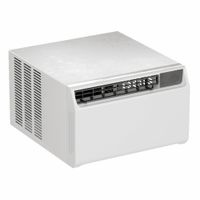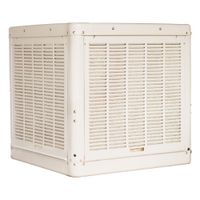Call +(254) 703 030 000 / 751 483 999 / 721 704 777
- Home
- Hvac And Refrigeration
- Air Conditioners Evaporative Coolers
.....Read More
Frequently Asked Questions
1. How do air conditioners work?
Air conditioners work by moving heat from inside your home to the outside, effectively cooling the indoor air. They achieve this through a refrigeration cycle involving several key components:1. **Refrigerant:** A special chemical compound that easily changes between liquid and gas states at different temperatures and pressures.
2. **Evaporator Coil:** Located inside the home, the liquid refrigerant absorbs heat from the indoor air as it passes over this coil, causing the refrigerant to turn into a gas. The now-cooled air is circulated back into the room.
3. **Compressor:** This component increases the pressure and temperature of the gaseous refrigerant.
4. **Condenser Coil:** Located outside the home, the hot, high-pressure refrigerant gas releases its absorbed heat to the outdoor air as it flows through this coil, causing it to condense back into a liquid.
5. **Expansion Valve (or Metering Device):** This valve reduces the pressure of the liquid refrigerant, causing it to cool down significantly before it returns to the evaporator coil to repeat the cycle.In essence, the air conditioner doesn't "create" cool air; it simply transfers heat from one place to another, making your indoor environment more comfortable.
2. What is the difference between an air conditioner and an evaporative cooler?
An air conditioner uses refrigerants to cool and dehumidify air, expelling hot air outside. It's effective in all climates but consumes more energy. An evaporative cooler, on the other hand, cools air by evaporating water. It's more energy-efficient and works best in dry climates, as it adds humidity to the air.
3. Which is more energy-efficient: air conditioners or evaporative coolers?
Evaporative coolers are generally more energy-efficient than air conditioners, particularly in hot, dry climates. Evaporative coolers work by adding moisture to the air, which lowers the air temperature through the process of evaporation. This method uses significantly less electricity compared to air conditioners, which operate by compressing and decompressing refrigerants to remove heat and humidity from the air. Air conditioners consume a large amount of energy, especially in humid environments where they also need to dehumidify the air.
However, the effectiveness and efficiency of evaporative coolers are limited by humidity levels. They perform best in arid regions, as high humidity reduces their ability to cool the air effectively. In contrast, air conditioners can cool effectively in a wider range of climates, including humid ones, but at a higher energy cost.
For regions with low humidity, an evaporative cooler can be a much more cost-effective and environmentally friendly cooling solution. In areas with high humidity, an air conditioner may be necessary, but it will come with higher energy consumption and associated costs.
4. Can evaporative coolers be used in humid climates?
Evaporative coolers, also known as swamp coolers, are generally not recommended for use in humid climates. Their cooling mechanism relies on the evaporation of water, which adds moisture to the air. In a dry climate, this added moisture can be beneficial, increasing comfort and providing effective cooling. However, in a humid climate, the air already contains a significant amount of moisture. Adding more humidity through an evaporative cooler will make the air feel muggy and uncomfortable, rather than cool and refreshing. The effectiveness of an evaporative cooler diminishes significantly as the relative humidity increases, making them inefficient in such conditions. For humid environments, air conditioners, which remove both heat and humidity from the air, are a more suitable and effective cooling solution.
5. How often should I maintain my air conditioner?
Regular maintenance is crucial for your air conditioner's efficiency and longevity. Ideally, you should have your AC system professionally serviced once a year, preferably in the spring before the cooling season begins. This annual check-up typically includes cleaning coils, checking refrigerant levels, inspecting electrical connections, and ensuring proper airflow.
In addition to professional servicing, there are simple tasks you can perform yourself to keep your AC running smoothly. You should change or clean your air filter every 1-3 months, or more frequently if you have pets or allergies. Keeping the outdoor unit clear of debris like leaves and twigs also helps maintain optimal performance. Regularly checking the condensate drain for clogs can prevent water damage and mold growth. By combining professional annual maintenance with these routine checks, you can ensure your air conditioner operates efficiently, saves energy, and lasts longer.
6. What size air conditioner do I need for my space?
The appropriate size of an air conditioner depends on several factors, primarily the square footage of the space you want to cool, but also considering ceiling height, insulation quality, window efficiency, and local climate. A common guideline is to calculate approximately 20 BTUs (British Thermal Units) per square foot.
For example, a 100 square foot room would typically need a 2,000 BTU unit, while a 500 square foot room might require a 10,000 BTU unit. However, if the room has high ceilings, many windows, poor insulation, or receives significant direct sunlight, you might need to slightly increase the BTU capacity. Conversely, a well-insulated room with minimal heat gain might be fine with a slightly smaller unit.
It's crucial not to oversize your air conditioner. An oversized unit will cool the space too quickly, cycling on and off frequently without adequately removing humidity, leading to a damp and clammy feeling. An undersized unit, on the other hand, will run continuously, struggling to cool the space and leading to higher energy bills. Consulting an HVAC professional for a precise load calculation is always recommended for optimal performance and efficiency, especially for larger or more complex spaces.
7. How do I choose between an air conditioner and an evaporative cooler?
Choosing between an air conditioner and an evaporative cooler depends largely on your climate and specific needs.
Air conditioners work by removing heat and humidity from the air, making them highly effective in hot, humid climates. They provide consistent cooling and can significantly lower indoor temperatures. However, they consume more energy, require a sealed environment (windows and doors closed), and can be more expensive to operate and install.
Evaporative coolers, also known as swamp coolers, cool the air by adding moisture. They are most effective in hot, dry climates, where the low humidity allows for efficient evaporation. They are energy-efficient, environmentally friendly, and provide fresh, circulated air. They also add humidity to the air, which can be beneficial in dry environments. However, their effectiveness is limited in humid climates, and they can increase indoor humidity levels.
Consider your local climate's humidity levels. If you live in a humid area, an air conditioner is generally a better choice. For arid or dry climates, an evaporative cooler can be a cost-effective and efficient cooling solution. Also, factor in energy consumption, initial cost, and maintenance requirements.
8. What are the benefits of using an evaporative cooler?
Evaporative coolers, also known as swamp coolers, offer several benefits, particularly in dry climates. They are significantly more energy-efficient than traditional air conditioners because they use a natural process of evaporation to cool the air, rather than refrigerants and compressors. This can lead to substantial savings on electricity bills. Additionally, evaporative coolers introduce moisture into the air, which can be beneficial in arid regions where dry air can cause discomfort, dry skin, and respiratory issues. They also operate with open windows, providing fresh, filtered air rather than recirculating stale indoor air. This constant air exchange can improve indoor air quality. Furthermore, the initial purchase and installation costs of evaporative coolers are generally lower than those of conventional AC units, making them a more budget-friendly cooling solution. They are also considered more environmentally friendly due to their lower energy consumption and the absence of harmful refrigerants.
9. How much does it cost to run an air conditioner compared to an evaporative cooler?
Please specify the topic you would like me to elaborate on.
10. How do I improve the efficiency of my air conditioner or evaporative cooler?
Please tell me what topic you would like me to elaborate on.

